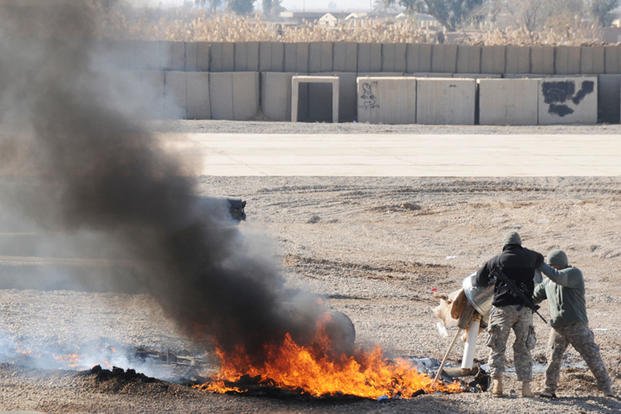A disturbing trend related to exposure to burn pits while deployed, recently detailed in a Wounded Warrior Project survey, has been noted by the Department of Veterans Affairs. But more research is needed before any changes to presumptive illnesses and benefits can be considered, according to a top VA official.
The VA currently lacks the scientific evidence to establish a causal relationship between exposure to burn pits and a variety of illnesses, but the WWP survey released last week will be taken into account, said Dr. Carolyn Clancy, the VA's deputy under secretary for Discovery, Education and Affiliate Networks.
At a Brookings Institution forum last week on the WWP survey, Clancy said of burn pit exposures, "We're learning a lot about it. We won't stop until we get some of these answers" to questions on whether presumptive illnesses can be approved for veterans exposed to burn pits.
Clancy said the VA is working with the National Academy of Sciences on research into burn pit exposures. "It is a very big focus for us," she said.
Related: 30 Percent of Veterans Have Had Suicidal Thoughts, New Survey Finds
The 10th annual survey of ill, injured and wounded veterans registered with WWP for the first time included questions on exposure to environmental hazards such as chemical warfare agents, ionizing radiation, burn pits and other potentially toxic substances during their military service.
Of the more than 35,900 respondents, about 70% said "they were definitely exposed in their time of service" to burn pits and other sources of toxins, said Dr. Melanie Mousseau, WWP's director of metrics, who called the findings “alarming.”
About 30% said they had registered with the VA's Burn Pit Registry, but only 9% had actually sought treatment, the survey showed.
Respondents indicating "Probably yes" or "Definitely yes" to exposure to environmental hazards during military service were more likely to rate their health as poor or fair (89.8%) than respondents who rated their health as "Very good" or "Excellent" (81.9%), the survey showed.
Despite efforts by Congress and advocacy and veterans groups to have burn pit exposure rated for care and benefits, the VA has consistently said that the scientific evidence is lacking.
The VA's website states, "At this time, research does not show evidence of long-term health problems from exposure to burn pits. VA continues to study the health of deployed Veterans."
-- Richard Sisk can be reached at Richard.Sisk@Military.com.
Read more: Trump to Restore SEAL Gallagher's Rank, Dismiss Soldiers' War Crimes Charges: Report













